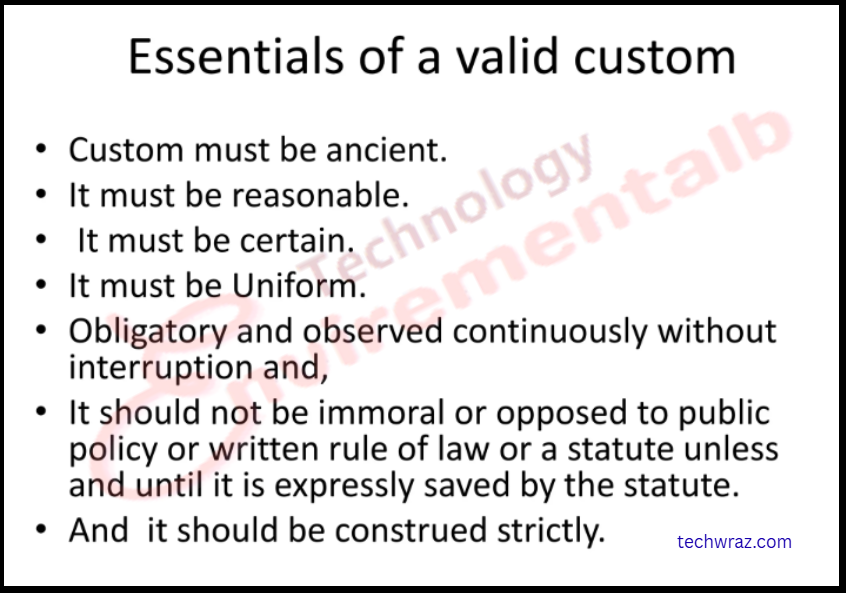Essentials of a valid custom: In the earlier ages the customs were the most important, and in some times/cases, the entire source of law. In every legal system, custom is considered a basic source of law or the main source for the development of law, but in modern and stable societies, they are more rationalized and are certain and definite. Custom, as a source of law, involves the study of a variety of its aspects: its origin and nature, its importance, reasons for its recognition, its classification, and the necessity of a valid custom.
Requisites of a Valid Custom
We explain all requirements that must be fulfilled for a valid custom. Custom must be reasonable, not contradictory with the state rules and regulations; it must be certain; it must be according to public benefit; it must be consistent; and the general public must accept it. All the essentials of valid custom are given below in detail and also shown below in the picture.
Reasonability
A custom must be according to basic morality, the prevailing understanding of justice, health, and what is best for public policy. If it is not reasonable in practice or origin, it cannot be considered a valid custom. For example, Sati was an accepted custom once, but with the modern moral understanding, it is not reasonable; therefore, it cannot be considered a custom today.
However, it does not mean that every custom must be perfect in its morality or ethical concerns or contain eternal wisdom; it just needs to be relevant to contemporary times, useful, and capable of being legislated on.
Conformity with Statute Law
The custom that is contravention to the existing law of the land is not accepted as a valid custom. Any practice, however widespread and accepted, if found in violation of any statute of said territory, cannot be considered as a valid custom. Here it must be clarified that in many areas in the world there are several customs that are not valid but are specifically adopted even now.
Certainty
A custom must be clear and unambiguous as to what the custom is and how it is practiced. A custom is not acceptable for a court of law when it is uncertain or indefinite. It needs to be objective and absolute in theory and in action.
Consistency
A custom must be consistent with the general principle of law that a state exists. These principles form the basis of ideas like fairness and liberty, and every custom must be in consonance with these.
Antiquity
It is a necessary requirement for the custom that it should be followed for time immemorial. The practice must be so interrelated in society. A practice cannot be custom until it becomes firmly established in society or fully acceptable in society.
Continuity
The custom does not come in conflict with other established customs; it’s also a very important requirement of a valid custom. All valid customs should maintain consistency among the other customs. Therefore, it is said that a custom cannot be established in opposition to other customs.
Must be peaceful in its practice
Any custom must be beautiful, and its practice should always be for the betterment of society. If a practice of any society is against the peace of any other society or the general public, it cannot be a custom.
Must not be opposed to Public Policy
A custom must not be opposed to the public policy because a valid custom always protects individuals and society.
Must be General or Universal
According to the definition of Carter, “Custom is effectual only when it is universal or nearly so. In the absence of unanimity of opinion, custom becomes powerless, or rather does not exist.”
